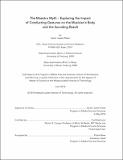The Maestro myth : exploring the impact of conducting gestures on the musician's body and the sounding result
Author(s)
Platte, Sarah Lisette
DownloadFull printable version (7.835Mb)
Alternative title
Exploring the impact of conducting gestures on the musician's body and the sounding result
Other Contributors
Program in Media Arts and Sciences (Massachusetts Institute of Technology)
Advisor
Tod Machover.
Terms of use
Metadata
Show full item recordAbstract
Expert or fraud? Opinions differ widely when it comes to the profession of the conductor. The powerful person in front of an orchestra or a choir attracts both hate and admiration, but which influence do a conductor's actions actually have on the musician's body and the sounding result? Unlike any other musician, the conductor produces no sound himself, and though the profession of conducting, as we know it today, has existed for more than 150 years, it still lacks a systematic theoretical foundation. Aiming to throw light on the fundamental principles of this special gestural language, this thesis approaches the communication between conductor and musician as a matter of physics and as an analogic -- rather than a symbolic -- language. By means of two studies we can prove a direct correlation between the gestures and muscle-tension of the conductor and the musicians' reaction in onset-precision as well as the quality and length of the evoked sound. While examining the gestural impact on the sounding result, we also examine, whether and in which way the mere form of the conducting gestures affect the musicians' stress level. With our research we contribute to the development of a theoretical framework on conducting and enable a precise mapping of its gestural parameters, the use of which -- not only in the discourse about conducting, but also as a base for hard- and software devices in the education of conductors -- could decisively enhance musical learning, performance and expression. Furthermore, this framework provides new insights into a number of aspects of musical perception.
Description
Thesis: S.M., Massachusetts Institute of Technology, School of Architecture and Planning, Program in Media Arts and Sciences, 2016. This electronic version was submitted by the student author. The certified thesis is available in the Institute Archives and Special Collections. Cataloged from student-submitted PDF version of thesis. Includes bibliographical references (pages 103-116).
Date issued
2016Department
Program in Media Arts and Sciences (Massachusetts Institute of Technology)Publisher
Massachusetts Institute of Technology
Keywords
Program in Media Arts and Sciences ()